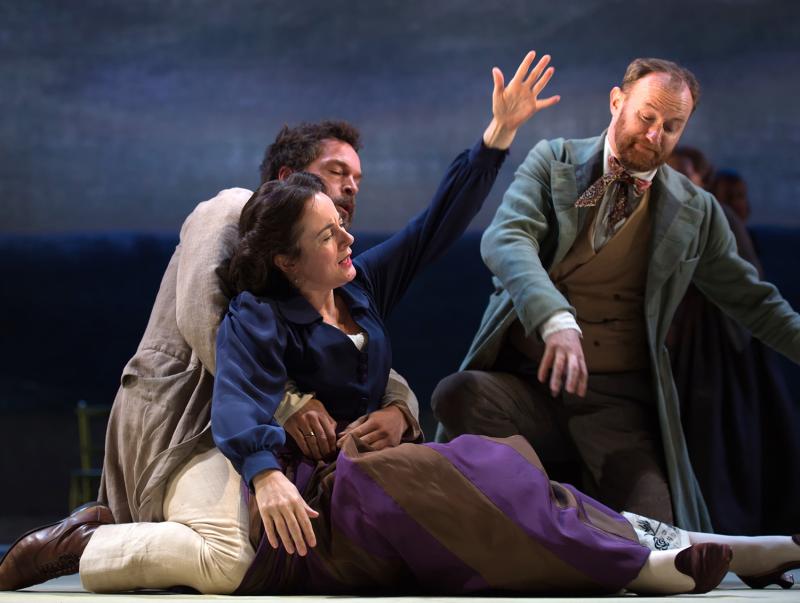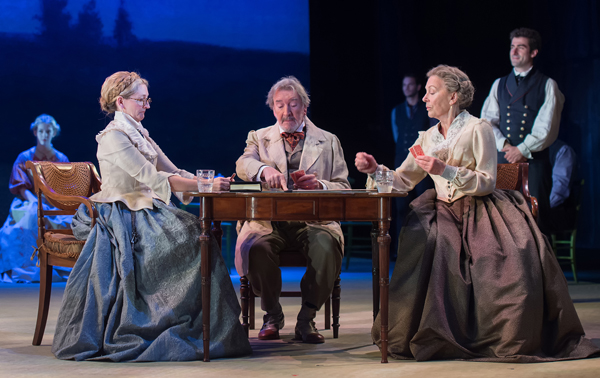Three Days in the Country, National Theatre | reviews, news & interviews
Three Days in the Country, National Theatre
Three Days in the Country, National Theatre
Patrick Marber’s adaptation of Turgenev’s classic is fun, but lacks subtlety and profundity

The trouble with the classics is that they are long, complex and difficult. But today’s sensibility favours the quick, simple and easy. So it is no surprise that the National Theatre have opened its doors to Patrick Marber, who has taken Ivan Turgenev’s 1850s play, A Month in the Country, and given it a makeover. After all, in its uncut original version it runs for four hours.
Often called a Chekhovian drama written a generation before Chekhov, Turgenev’s play is set in a country estate and features a collection of irresolute gentry spending the languorous summer months together. The plot is an interlocking series of stories of love: the household is headed by Arkady, who is an improving landlord, and Natalya. Their marriage is arid so Natalya is having a long but unconsummated relationship with Rakitin, Arkady’s best friend. When a young tutor, Belyaev, arrives, Natalya falls head-over-heels in love with him. But then so does Vera, her 17-year-old ward. For his part, Belyaev is more drawn to Katya, a maid.
The keynote of the writing is its stress on comic absurdity
Add to this a host of other characters: Arkady and Natalya’s 10-year-old son, Kolya, who adores Belyaev; Anna, Arkady’s mother; Lizaveta, Anna’s companion; Schaaf the German tutor; Bolshintsove, an elderly rich neighbour and the suitor of Vera; Matvey, a servant who loves Katya; and, last but not least, Shpigelsky, the local doctor (Gatiss), who is incompetent but charming. You can easily see why the original version of the play is a baggy masterpiece. Marber’s version is fast on its feet – lasting about 135 minutes – and its action unfolds with a kind of joyous rapidity.
The keynote of the writing is a stress on the comic absurdity of human endeavour, and an ironically cool detachment from the characters. Unlike Chekhov, who is the master of the subtext, Marber here spells out most of the conflicts, dotting i-s and crossing t-s, giving the characters a fair bit of self-awareness and a handful of revealingly self-reflexive speeches. This has the advantage of clarity, if not subtlety. The jokes are good, and they come thick and quick. Typically, the doctor complains plaintively: “How am I to survive if people simply get better?”
The chaos caused by amorous desire, even in an age of restraint, is well presented. Natalya, who understands how her relationship with her father has damaged her psyche, falls passionately in love with an entirely unsuitable man who is half her age. Meanwhile, her long-standing love, Rakitin (Simm), is stuck in an unending and unsatisfying relationship with her, to the frustration of both. By contrast, the young love expressed in different ways by Vera, Matvey and Belyaev is like a flame that flares up quickly, only to be snuffed out almost immediately. Most comically, the scene in which the doctor proposes marriage to Lizaveta is a comic masterclass, played brilliantly by Gatiss and Debra Gillett.
 Other themes include the pre-Chekhovian feeling that the gentry is wasting their time in despair, along with intimations of violent social and political change. Somewhere on the horizon a revolution is gathering strength. At the same time, what Karl Marx called the “idiocy of rural life” is pictured in a comic register, symbolised by Natalya’s statement that “It is wrong to jump on a cow”. Various shades of despair and disappointment afflict many of the characters, and leave a rather sad aftertaste. But although there is plenty to enjoy here, I did feel that a complete rewrite that reimagined the story for our contemporary world would have been more interesting. This is Turgenev lite.
Other themes include the pre-Chekhovian feeling that the gentry is wasting their time in despair, along with intimations of violent social and political change. Somewhere on the horizon a revolution is gathering strength. At the same time, what Karl Marx called the “idiocy of rural life” is pictured in a comic register, symbolised by Natalya’s statement that “It is wrong to jump on a cow”. Various shades of despair and disappointment afflict many of the characters, and leave a rather sad aftertaste. But although there is plenty to enjoy here, I did feel that a complete rewrite that reimagined the story for our contemporary world would have been more interesting. This is Turgenev lite.
Marber directs in a competent, but rather uninspiring way. Amanda Drew is better at conveying the self-loathing Natalya’s fragility than her charisma, but maybe her ordinariness is precisely the point in this version. As ever, Gatiss is a joy to watch, especially when playing drunk, and both Simm and John Light (Arkady) are suitably restrained and, when neeeded, passionate. Lily Sacofsky’s Vera and Gawn Grainger’s Schaaf (pictured above) work well in support. A cluster of visual jokes – about raspberries, kites and bad backs – help the fun along, but this is an evening that is never more than the sum of its parts.
rating
Buy
Explore topics
Share this article
The future of Arts Journalism
You can stop theartsdesk.com closing!
We urgently need financing to survive. Our fundraising drive has thus far raised £49,000 but we need to reach £100,000 or we will be forced to close. Please contribute here: https://gofund.me/c3f6033d
And if you can forward this information to anyone who might assist, we’d be grateful.

Subscribe to theartsdesk.com
Thank you for continuing to read our work on theartsdesk.com. For unlimited access to every article in its entirety, including our archive of more than 15,000 pieces, we're asking for £5 per month or £40 per year. We feel it's a very good deal, and hope you do too.
To take a subscription now simply click here.
And if you're looking for that extra gift for a friend or family member, why not treat them to a theartsdesk.com gift subscription?
more Theatre
 Troilus and Cressida, Globe Theatre review - a 'problem play' with added problems
Raucous and carnivalesque, but also ugly and incomprehensible
Troilus and Cressida, Globe Theatre review - a 'problem play' with added problems
Raucous and carnivalesque, but also ugly and incomprehensible
 Clarkston, Trafalgar Theatre review - two lads on a road to nowhere
Netflix star, Joe Locke, is the selling point of a production that needs one
Clarkston, Trafalgar Theatre review - two lads on a road to nowhere
Netflix star, Joe Locke, is the selling point of a production that needs one
 Ghost Stories, Peacock Theatre review - spirited staging but short on scares
Impressive spectacle saves an ageing show in an unsuitable venue
Ghost Stories, Peacock Theatre review - spirited staging but short on scares
Impressive spectacle saves an ageing show in an unsuitable venue
 Hamlet, National Theatre review - turning tragedy to comedy is no joke
Hiran Abeyeskera’s childlike prince falls flat in a mixed production
Hamlet, National Theatre review - turning tragedy to comedy is no joke
Hiran Abeyeskera’s childlike prince falls flat in a mixed production
 Rohtko, Barbican review - postmodern meditation on fake and authentic art is less than the sum of its parts
Łukasz Twarkowski's production dazzles without illuminating
Rohtko, Barbican review - postmodern meditation on fake and authentic art is less than the sum of its parts
Łukasz Twarkowski's production dazzles without illuminating
 Lee, Park Theatre review - Lee Krasner looks back on her life as an artist
Informative and interesting, the play's format limits its potential
Lee, Park Theatre review - Lee Krasner looks back on her life as an artist
Informative and interesting, the play's format limits its potential
 Measure for Measure, RSC, Stratford review - 'problem play' has no problem with relevance
Shakespeare, in this adaptation, is at his most perceptive
Measure for Measure, RSC, Stratford review - 'problem play' has no problem with relevance
Shakespeare, in this adaptation, is at his most perceptive
 The Importance of Being Earnest, Noël Coward Theatre review - dazzling and delightful queer fest
West End transfer of National Theatre hit stars Stephen Fry and Olly Alexander
The Importance of Being Earnest, Noël Coward Theatre review - dazzling and delightful queer fest
West End transfer of National Theatre hit stars Stephen Fry and Olly Alexander
 Get Down Tonight, Charing Cross Theatre review - glitz and hits from the 70s
If you love the songs of KC and the Sunshine Band, Please Do Go!
Get Down Tonight, Charing Cross Theatre review - glitz and hits from the 70s
If you love the songs of KC and the Sunshine Band, Please Do Go!
 Punch, Apollo Theatre review - powerful play about the strength of redemption
James Graham's play transfixes the audience at every stage
Punch, Apollo Theatre review - powerful play about the strength of redemption
James Graham's play transfixes the audience at every stage
 The Billionaire Inside Your Head, Hampstead Theatre review - a map of a man with OCD
Will Lord's promising debut burdens a fine cast with too much dialogue
The Billionaire Inside Your Head, Hampstead Theatre review - a map of a man with OCD
Will Lord's promising debut burdens a fine cast with too much dialogue

Add comment